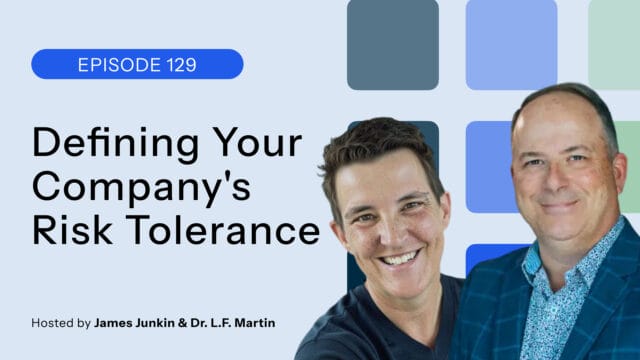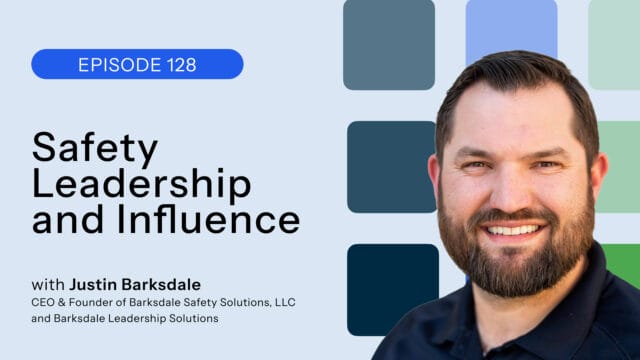
Defining Your Company’s Risk Tolerance | Risk Matrix Episode 129
THE RISK MATRIX Cutting-edge podcast on occupational safety and risk management. Hosted by industry titans: JAMES JUNKIN, MS, CSP, MSP,…

In its broadest sense, the word “value” represents the significance or worth we attribute to things, actions, or ideas. However, with that attribution comes a crucial distinction — something being of value versus embodying a value. Regarding safeguarding workers on a job site, that subtle difference forms a dichotomy between the oft-overused phrase “safety is a core value” and treating safety as a core value we should all have at work, home, and play.
There are shades of grey in understanding the difference between being a value and something of value. In workplace safety, the ideas of value and embodying a value often mix in complex ways.
This article explores the difference between something having value and being a fundamental value and digs into how this impacts our principles, actions, and significance in our lives and at work.
The distinction between two fundamental concepts is the first thing we must make very clear and straightforward. That would be “Value” and “Being A Value.” We need to define these before we go any further.
Value, at its core, represents something essential or worthy. On the other hand, being a value goes beyond recognition; it involves consciously or actively aligning with specific principles or beliefs. When we say, “Treat safety as a core value,” we acknowledge its significance. However, the true essence lies in integrating safety into our daily actions and decisions, signifying that it’s ‘being a value.
So, when our daily actions and decisions are involved, we move from being a value to being a value. It’s the “doing” that is the difference.
Safety undeniably holds immeasurable worth for every individual in the workplace. Everyone genuinely values safety personally, forming the foundation for a secure work environment.
It’s important to note that not everything considered valuable is inherently connected to ethical or moral considerations. This distinction becomes evident when we think about how we appreciate nature, our personal preferences, and the value we place on economic factors.
Recognizing the distinction between something being of value and embodying a value requires thoughtful reflection on the principles guiding our actions. While everyone would readily acknowledge the importance of safety as a value, its true power lies in becoming an actual part of our daily actions and decisions.
To summarize, value is different for everyone. Safety as a value is essential to everyone and becomes ‘real’ when action is taken every day, with every decision, with safety as the goal.
To indeed ‘be a value‘ involves matching one’s actions and decisions with guiding principles, ethics, or beliefs that resonate deeply and profoundly. The typical values of honesty, integrity, compassion, and justice serve as universal pillars everyone recognizes, transcending cultural, geographical, and religious boundaries.
Personal values significantly influence how individuals perceive what holds importance and worth in their lives. Recognizing value in specific aspects of life plays a pivotal role in developing and refining personal values. For instance, a solid commitment to environmental conservation aligns with stewardship and responsibility values.
Do you volunteer with or support charitable organizations? This is a tangible manifestation of values like altruism, compassion, and social responsibility. It showcases how individuals can translate their beliefs into meaningful, impactful actions that benefit society and the world. These actions embody what it means to ‘be a value.’
Incorporating these concepts into everyday life is possible in countless ways, including the following considerations:
What about morals? In moral dilemmas, it becomes essential to discern between something merely holding value and embodying a value. Take, for instance, the ethical challenges medical professionals face, who must weigh competing values when facing life-altering patient care decisions.
In morally delicate situations, it becomes evident that something deemed valuable or worthy may significantly differ from ‘being a value.’ Here, the ethical compass demands precise calibration and a nuanced (or shades of gray) understanding of these distinctions.
While this discussion may initially seem esoteric, its significance must be balanced. The differentiation between something having value and something truly being a value is a catalyst for recognizing the profound importance that shapes our lives and work. It highlights how we discover meaning, worth, and significance in our world.
Understanding the differences between value and being a value calls for a renewed look at our day-to-day beliefs and actions. As we navigate the landscape of workplace safety, the journey delves deep into what defines us as individuals, professionals, and members of a collective society. It encourages us to ponder the principles guiding our actions and how we find meaning, worth, and significance in our complex world.
Contact us today to learn more.
James A. Junkin, MS, CSP, SMS, ASP, CSHO is the chief executive officer of Mariner-Gulf Consulting & Services, LLC and the chair of the Veriforce Strategic Advisory Board and the chair of Professional Safety journal’s editorial review board. He is Columbia Southern University’s 2022 Safety Professional of the Year (Runner Up) and a much sought after master trainer, keynote speaker, podcaster, and author of numerous articles concerning occupational safety and health.


THE RISK MATRIX Cutting-edge podcast on occupational safety and risk management. Hosted by industry titans: JAMES JUNKIN, MS, CSP, MSP,…

THE RISK MATRIX Cutting-edge podcast on occupational safety and risk management. Hosted by industry titans: JAMES JUNKIN, MS, CSP, MSP,…
We’ll send you practical and insightful supply chain risk management info that can benefit your business. Plus, important company updates that keep you in the loop.
